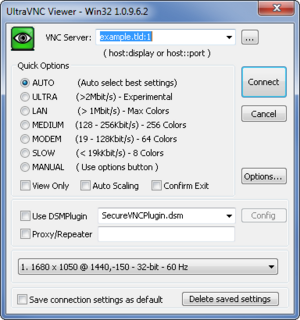Software:UltraVNC
 Screenshot of UltraVNC Viewer connection dialog. | |
| Original author(s) | |
|---|---|
| Developer(s) | |
| Initial release | 5 December 2002[1] |
| Written in | C, C++ and Java |
| Operating system | |
| Platform | |
| Size | About 5 MB |
| Available in | |
| Type | |
| License | GPL-2.0-or-later |
| Website | {{{1}}} |
UltraVNC (sometimes written uVNC) is an open-source remote-administration/remote-desktop-software utility. The client supports Microsoft Windows and Linux but the server only supports Windows.[2] It uses the RFB (VNC) protocol to allow a computer to access and control another one remotely over a network connection.
Features
UltraVNC allows the use of a remote computer as if the user were in front of it. This is achieved by sending mouse movements and key-presses to the remote computer, and replicating the remote computer's display (subject to differences in resolution) locally in real time. UltraVNC bears a strong resemblance to RealVNC Free Edition. However, in addition to remote control, it adds various features, such as an encryption plugin to secure the client/server connection. It also supports file transfers, chat functionality and various authentication methods. The two computers must be able to communicate across a network, such as a local subnet, internal network, or the Internet. The software is free and distributed under the terms of the GNU General Public License.
It can use an optional mirror driver installed on the remotely controlled computer for fast and efficient notification of screen changes with very low CPU load,[3] although this is not needed since later versions of Windows 10.[4]
History
UltraVNC is the result of the merger of Vdacc-VNC started by Rudi De Vos in 1999 and eSVNC started by Sam in 2002.[1]
UltraVNC is developed in the C, C++, and Java programming languages.
Since release 1.0.6.4, UltraVNC server can work as a Windows service under User Account Control (UAC).
Reverse control
UltraVNC is notable as the base for free no-install remote help desk options including UltraVNC SC (Single Click) and PCHelpWare. These operate by generating pre-configured executables that can be downloaded and run on systems needing support; these applications then connect back to server software running on the system providing support.
See also
- Comparison of remote desktop software
- File transfer
- Remote administration
- Remote desktop software
- Remote support
- RFB (protocol)
- Virtual Network Computing (VNC)
References
- ↑ 1.0 1.1 1.2 1.3 1.4 1.5 1.6 on UltraVNC website.
- ↑ "UltraVNC server for Linux. - UltraVNC". February 2006. https://forum.uvnc.com/viewtopic.php?t=5699.
- ↑ Mirror driver on UltraVNC Website.
- ↑ uVNC Mirror Driver for Windows 10 / 2012, UltraVNC Forum.
External links
- No URL found. Please specify a URL here or add one to Wikidata.
- Official forum
- on GitHub
- UltraVNC on SourceForge.net
 |
